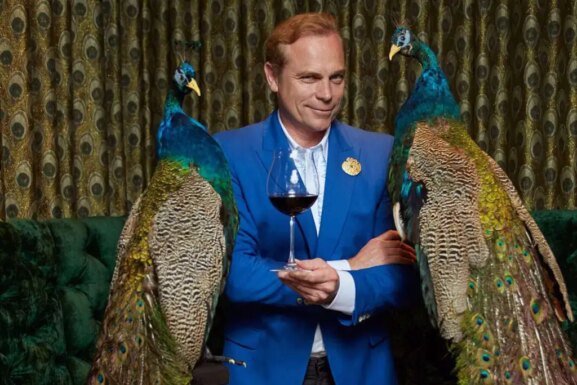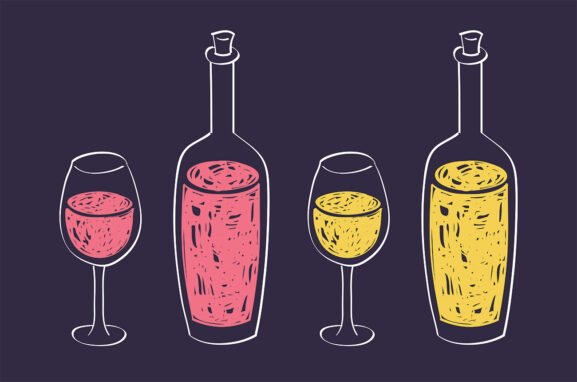‘Witchy’ Winemaking Traditions Date Back Millenia
Over the past several years, a new wave of “witchy winemakers” has been making a splash in the beverage industry.
Future 40 Tastemaker Nancy Ulloa, the self-described “wine witch” behind Ulloa Cellars, infuses her bottlings with “metaphysical and spiritual methods.” She gives offerings to the vineyards prior to harvesting her grapes. She uses crystals and recites affirmations during the fermentation and aging process.
Brittany Banda of Xochil Wines, another Paso Robles-based, Latina-owned brand, uses Mesoamerican deity oracle cards to seek guidance from her ancestors throughout the winemaking process. Up in Mendocino, recently launched Bad Witch Wines also incorporates rituals into her winemaking.
This trend sounds very new age. But with thousands of years of religious tradition and history related to wine, infusing spiritual practices into production can’t be new, right? To answer that question, we sit down with historian Julia Schifini of Spirits Podcast, a boozy dive into mythology, folklore, and urban legends, for this episode of the Wine Enthusiast Podcast.
In this pre-Halloween conversation, Schifini takes us all the way back to Phoenicia through the ancient Greeks and Romans to the rise of Christianity, the Inquisition, and more to explore how winemakers and drinkers have been combining spiritual and religious practices with “the drink of the gods” throughout the ages.
The Highlights
On WitchTok’s influence on modern day “witchy” practices
Julia Schifini: “The evolution of Tumblr to Vine to Tiktok is a good sort of way to encapsulate what ‘witchy’ means now, as opposed to what witchy meant in the late ‘90s/early 2000s where you had Buffy the Vampire Slayer or Charmed. The idea of ‘witchy’ is now taking what are essentially very individual pagan and witchcraft practices and making them more mainstream, making them more available to people who might not have had resources for that sort of thing before the internet, or before the creation of WitchTok. It’s the introduction of the customized feed.
So, I think that when we talk about witchy now, it is really defined by like tarot readings and crystals and making offerings to ‘gods,’ depending on how you feel about whether or not the WitchTok witches are really casting spells or not. But it’s like this idea that there is now a lot more freely available information … than it would have been 10 years ago, 15 years ago, 20 years ago.”
On the “witchiness” of biodynamics and folk agricultural practices
JS: “I think that the inventor of biodynamics, Rudolph Steiner, would also agree with [it falling under the category of ‘witchy’] in a certain aspect. He really wanted to focus on treating the earth as sort of this living and receptive organism in his own words. And this guy was like a jack of all trades, right? He was like dabbling in philosophy. He was a literary critic. He claimed he was clairvoyant— like he was an interesting, interesting guy. But at the time, he was really trying to merge this idea of science and spirituality together. When he was creating what would become biodynamics, he really wanted to incorporate not only these now scientifically proven methods that help the soil and maintain the nutrients it needs, but he was also like, We should plant alongside the full moon, because the ground soil is pulled gravitationally, much like the tides are in the ocean. So there is a certain amount of witchiness to it, because it really does sort of embrace folk medicine beliefs that I think have been historically proven to work.”
// Create the element
var script_68f8d5cd936af = document.createElement(“script”);
script_68f8d5cd936af.innerHTML = `
window.googletag = window.googletag || {cmd: []};
googletag.cmd.push(function() {
var adType = “leaderboard”;
var mapping;
var lbmapping = googletag.sizeMapping()
.addSize([1024, 0], [[970, 250], [970, 90], [1, 1], [728, 90]])
.addSize([728, 0], [[728, 90], [1, 1]])
.addSize([320, 0], [[1, 1], [300, 50], [300, 100], [320, 50], [320, 100]])
.addSize([0, 0], [[1, 1], [320, 50]])
.build();; // Size mapping for leaderboard ads
var medrecmapping = googletag.sizeMapping()
.addSize([1024, 0], [[300, 600],[300, 250]])
.addSize([728, 0], [300, 250])
.addSize([320, 0], [[1, 1],[300, 250]])
.addSize([0, 0], [[1, 1], [300, 250]])
.build(); // Size mapping for med rectengle ads
if(‘/39808611/article_page/article_leaderboard_1’ == ‘/39808611/article_page/article_leaderboard_1’
|| ‘/39808611/article_page/article_leaderboard_1’ == ‘/39808611/article_page/article_leaderboard_2’
|| ‘/39808611/article_page/article_leaderboard_1’ == ‘/39808611/article_page/article_leaderboard_3’) {
mapping = googletag.sizeMapping()
.addSize([1920, 0], [[728, 90]]) // >= 1920px
.addSize([1440, 0], [[728, 90]]) // 1440px-1919px
.addSize([730, 0], [[300, 250]]) // 730px-1439px
.addSize([0, 0], [[320, 100], [320, 50], [300, 100], [300, 50], [300, 250]]) // Up to 729px
.build();
} else {
mapping = adType == ‘leaderboard’ ? lbmapping : medrecmapping;
}
googletag.defineSlot(‘/39808611/article_page/article_leaderboard_1’, [],
‘div-gpt-ad-68f8d5cd936af’).addService(googletag.pubads()).defineSizeMapping(mapping);
googletag.pubads().enableSingleRequest();
googletag.pubads().collapseEmptyDivs();
googletag.display(‘div-gpt-ad-68f8d5cd936af’);
});
`;
// Append the script to the body
document.body.appendChild(script_68f8d5cd936af);
On the beginnings of wine meeting spirituality
JS: “As soon as we realized that wine was something that people might want and might like to trade for, it became this luxury item. And because it is a luxury item, that means it will become a perfect offering for the dead or your king or the gods. As soon as we realized wine had value, we were like we should be offering this up to our spiritual higher ups. This is a practice that is found across the world: the pouring out of libations as a religious practice, I would say, literally, happens across the entire world. You start seeing this pretty much as soon as wine is on the scene. The Phoenicians were probably the first ones in terms of cultures that sort of kicked off the wine trade in the Mediterranean, which then helped it spread as something that was considered an acceptable offering for both kings and also gods.”
“Pretty much across the world, if you could grow grapes, they were going to be a part of your religious practice, particularly in the form of wine. So, people were drinking wine at religious festivals in ancient Egypt, in Sumeria, in Babylon.”
On the importance of wine in ancient Greece and Rome
JS: “In ancient Greece and in Rome, wine was made as offerings to the gods. It was made as offerings to the dead. It was incredibly important to many historical religions. A lot of people know of Dionysus, or the Roman equivalent of Bacchus, but Dionysus was the god of wine. He was also the God of festivity. He was the god of ritual madness and he was also the god of religious ecstasy. These are like incredibly important religious practices that Dionysus, as the god of wine, is involved in.”
“A lot of the festivals for Dionysus originally started as agrarian festivals. So, it was the people who were growing the vines and the people who were harvesting and then making the wines, who were the first people to celebrate these festivals themselves.”
“All of these festivals end up leading into what a lot of people will probably recognize as the Bacchanalia. Dionysus was copy-pasted by the Romans into the god Bacchus, and then the Bacchanalia was the festival that honored Bacchus. Now, if you’ve heard the phrase Bacchanalia, what it ended up being was probably exactly what you’re picturing in your mind. It is drunken debauchery. Essentially, it was a three day sex fest with lots of drinking and stuff like that.”
On how Christianity fueled winemaking
JS: “Bacchus and the Bacchanalias transferred from ’pagan’ to the Catholic Church in this region.”
“The Church was like, we really need to make sure that grape growing and wine making technology survives from the transition from the quote-unquote pagan days to the rise of the Catholic Church. They were like, we need so much wine. We need to make sure that the wine keeps being made. So they were extremely important in actually preserving the grape growing and the winemaking technology from this time period. And then this is also how you get the monasteries producing wine, starting in the Middle Ages and onward, even to this day, like the creation of alcohol within the grounds of religious institutions, especially within the Catholic Church, but also in Christianity in general, very important.”
// Create the element
var script_68f8d5cd93c87 = document.createElement(“script”);
script_68f8d5cd93c87.innerHTML = `
window.googletag = window.googletag || {cmd: []};
googletag.cmd.push(function() {
var adType = “leaderboard”;
var mapping;
var lbmapping = googletag.sizeMapping()
.addSize([1024, 0], [[970, 250], [970, 90], [1, 1], [728, 90]])
.addSize([728, 0], [[728, 90], [1, 1]])
.addSize([320, 0], [[1, 1], [300, 50], [300, 100], [320, 50], [320, 100]])
.addSize([0, 0], [[1, 1], [320, 50]])
.build();; // Size mapping for leaderboard ads
var medrecmapping = googletag.sizeMapping()
.addSize([1024, 0], [[300, 600],[300, 250]])
.addSize([728, 0], [300, 250])
.addSize([320, 0], [[1, 1],[300, 250]])
.addSize([0, 0], [[1, 1], [300, 250]])
.build(); // Size mapping for med rectengle ads
if(‘/39808611/article_page/article_leaderboard_2’ == ‘/39808611/article_page/article_leaderboard_1’
|| ‘/39808611/article_page/article_leaderboard_2’ == ‘/39808611/article_page/article_leaderboard_2’
|| ‘/39808611/article_page/article_leaderboard_2’ == ‘/39808611/article_page/article_leaderboard_3’) {
mapping = googletag.sizeMapping()
.addSize([1920, 0], [[728, 90]]) // >= 1920px
.addSize([1440, 0], [[728, 90]]) // 1440px-1919px
.addSize([730, 0], [[300, 250]]) // 730px-1439px
.addSize([0, 0], [[320, 100], [320, 50], [300, 100], [300, 50], [300, 250]]) // Up to 729px
.build();
} else {
mapping = adType == ‘leaderboard’ ? lbmapping : medrecmapping;
}
googletag.defineSlot(‘/39808611/article_page/article_leaderboard_2’, [],
‘div-gpt-ad-68f8d5cd93c87’).addService(googletag.pubads()).defineSizeMapping(mapping);
googletag.pubads().enableSingleRequest();
googletag.pubads().collapseEmptyDivs();
googletag.display(‘div-gpt-ad-68f8d5cd93c87’);
});
`;
// Append the script to the body
document.body.appendChild(script_68f8d5cd93c87);
On reclaiming these traditions
JS: “A lot of these historical traditions and historical religions that we’ve talked about, even when they were huge statecraft versions of those religions, have been essentially wiped out because of colonization and the spread of Christianity and the persecution of non Christian beliefs during those time periods. As a result, these [modern] practitioners are reclaiming parts of their culture that were destroyed or at least significantly reduced by the spread of Christianity, but also at the same time, they are able now because we’ve done so much historical, archeological, and anthropological research… take that information and practice how they want to practice, because there obviously is no organized version of that anymore.”
“Because it’s practiced on an individual level, it is an extremely personal thing. There is some guidance that can be found out there, like WitchTok and things like that, but a lot of practicing witches will worship in the way that feels right to them, rather than how they are told by an elder or by an organized religion. There is something really beautiful about bringing back a religious practice or spiritual practice that speaks to you, and was something that your ancestors might have been able to do, but now were separated because of various different reasons and how history has moved over the course of the past hundreds of years.”
The Guest
Julia Scifini is a writer, historian, voice actor, and lover of all things creepy and cool. She is the cohost of Spirits, a comedic history podcast that pairs discussions about mythology, folklore, and urban legends with wine and cocktails. Julia holds degrees in history and religious studies, and lives on Long Island, New York.
More About the Podcast
The Wine Enthusiast podcast is your serving of drinks culture and the people who drive it. You can subscribe to this podcast on Apple, Spotify and anywhere else you listen to your favorite shows. Visit the podcast homepage for more episodes and transcripts.

More Halloween Coverage
- Get into the Halloween spirit at these spooky bars.
- Seven spooky spirits to pour for Halloween this year.
- Wanna hear some scary stories from haunted wineries? Listen to this Wine Enthusiast podcast episode from last year.
- This red wine caramel apple recipe adultifies the holiday classic.
- And try these expert-picked wine pairings for Halloween candy.

In the Shop
Organize and Display Your Wine in Style
Put an exceptional wine selection on display with decorative wine racks of every style, size, and placement for your home.
The post ‘Witchy’ Winemaking Traditions Date Back Millenia appeared first on Wine Enthusiast.


